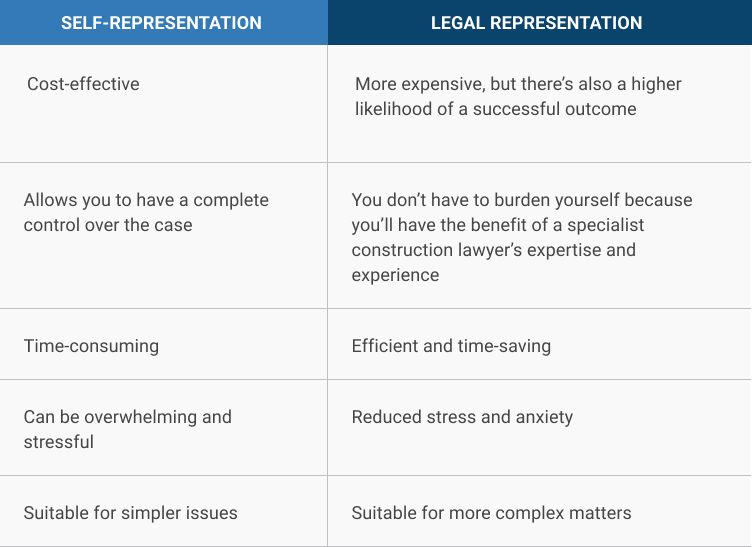Do You Need Legal Representation at NCAT?
If you’re contemplating lodging a complaint with the (NCAT), one of the biggest questions you may have is whether you need legal representation. The answer to this question depends on several factors, such as:
- the complexity of your case
- your knowledge of the legal system
- the stakes involved
In this section, we’ll explore the options available to you and help you make an informed decision.
Self-representation vs. Legal Representation

Right to Legal Representation
Special Types of Representation
The NCAT recognises that parties with disabilities may require special types of representation. In some cases, the NCAT can appoint a separate representative for parties with disabilities. Additionally, a Guardian ad Litem may be appointed to represent the interests of a person who can’t make decisions for themselves, such as a child or a person with a disability. The role of a Guardian ad Litem is to ensure that the person’s interests are protected throughout the proceedings.
In the next section, we’ll explore the steps involved in representing yourself at NCAT.
What is the NCAT Process Like?
Lodging an Application
To lodge an application with NCAT, you’ll need to complete the relevant application form and provide any supporting documents required. The process can be simple or complex, depending on the nature of your dispute. Here are the steps involved:
- Determine the type of dispute you have and ensure that NCAT has jurisdiction over the matter.
- Complete the relevant application form and provide any supporting documents required.
- Pay the lodgement fee (if applicable).
- Serve the application and any supporting documents on the other party (if applicable).
- Attend the initial conference or mediation (if applicable).
The types of disputes that can be heard at NCAT include:
- Building and construction disputes
- Consumer disputes
- Tenancy disputes
- Guardianship and financial management disputes
- Administrative reviews
The NCAT also provides various methods of dispute resolution, including:
- Mediation
- Conciliation
- Case appraisal
- Hearing and determination
Related Content: How To Lodge an NCAT Application
Request for Legal Representation at the NCAT
Notice of Representation
Related Content: Find NCAT Lawyers and Legal Representation for Building Disputes
Is Legal Representation Necessary?
Cost Implications
One of the most significant factors to consider when deciding whether to engage a legal practitioner at NCAT is the cost implications. Legal representation can be expensive, and it’s essential to weigh up the potential costs against the potential benefits. The value of the matter and the power imbalance between the parties should also be considered.
For example, if the dispute involves an ordinary homeowner against a big, large scale Builder, there may be a power imbalance between the parties. Hence, engaging a lawyer may be necessary to ensure a favourable outcome for the homeowner.
Other Factors to Consider
Apart from cost implications, there are other factors to consider when deciding whether to engage legal representation at the NCAT. These include the complexity of the issues involved and the other party’s legal representation.
If the matter is straightforward and the other party is not represented, self-representation may be sufficient. However, if the matter is complex or if the other party is represented, engaging a lawyer may be necessary to level the playing field.
Additionally, legal representation can provide several advantages, including:
Expertise
Lawyers who specialise in construction law and have experience appearing before the NCAT can provide valuable expertise and insights into the legal system.
Efficiency
Lawyers can navigate complex legal processes to ensure that the matter is resolved efficiently and effectively.
Objectivity
Lawyers can provide an objective perspective on the matter and offer advice that’s in your best interests.

The Home Building Act 1989 (NSW)
The Home Building Act 1989 (NSW) provides a framework for residential building works in New South Wales, including the rights and responsibilities of homeowners and builders. As a homeowner in NSW, you are entitled to certain rights under the Act, including:




